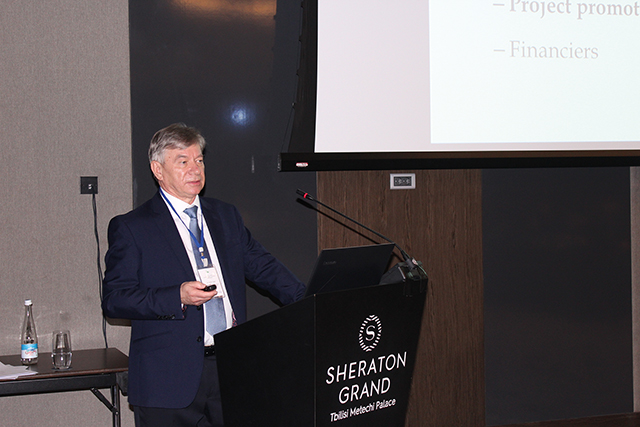Accelerating Georgia’s Transition to a Circular Economy. Part II
BLOG
The article discusses the key principles and conditions required for an accelerated transition to the circular economy, a new economic model that represents sustainable progress towards efficient green growth and provides the framework to develop new business models aimed at increasing the value, use and life of materials, products and assets. Embracing the circularity principles can also accelerate the recovery from the economic downturn caused by COVID-19.
Can Georgia go circular on its own?
No government is capable of carrying out the transition on its own. Cities and local communities play a crucial role in the transition: they are increasingly recognized as the central generators of circular change. In the process of creating the roadmap to circularity, various available resources need to be considered. From guidelines found in EU documents to national documents, but above all, the concrete examples presented in the reports of the Ellen MacArthur Foundation, the McKinsey and Systemiq Companies, the Circle Economy – The Circularity Gap Report, the Dutch, Finnish and Danish Roadmaps, and various other documents. This will allow the formation criteria for the inclusion of good practices taking into account Georgian specifics, both in its natural resources, driving forces behind its economy, hubs of change and cultural models.
Georgia should benefit from the experiences of more advanced economies in the implementation of the circularity principles, and learn from their successes and mistakes. This calls for strong partnerships in order to choose the optimal path to the transition to a circular economy. A good example of such a partnership is the program supported by the Government of Sweden aimed at promoting the circular economy. The ongoing program being implemented by CSO Georgian Society of Nature Explorers ‘Orchis’, within the framework of the ‘Keep Georgia Tidy’ project has already raised much-needed awareness about the circular economy and provided recommendations to various groups of stakeholders, including policy-makers, financial institutions and project promoters, on how to accelerate the implementation of circular economy principles at various levels of economic activity. This program is the basis for an accelerated shift to circularity. It is also a vital contribution to fulfil Georgian commitments under the Association Agreement with the European Union. However, this shift requires action at many levels and, therefore, there is a need for stronger partnerships and cooperation to launch a set of actions designed to provide impetus for an accelerated transition to a circular economy. These partnerships would assist Georgia in defining specific objectives based on an analysis of the existing needs, experiences and opportunities.
How can circularity help in the current economic downturn?
The transition to a circular economy is at an early stage even in the most developed countries of the world. It is crucial for transitional economies like Georgia to take advantage to be at the forefront of development and become a regional leader in the next stage of development, which has the potential to significantly accelerate the sustainability agenda. In addition, embracing circularity can greatly contribute to the recovery from the economic downturn caused by COVID-19. The COVID-19 crisis has shone a spotlight on the resilience of global value chains, which have become increasingly complex and globalized in recent decades.
The recovery measures proposed by governments present an opportunity to seek greater circularity in supply chains, which can act both to improve resource efficiency and resilience for businesses (by building greater resilience to supplier risks) and society (by reducing environmental risks). In circular value chains, waste is minimized and end-of-life products are recovered for reuse, remanufacture, and recycling. This is achieved through improved product design (e.g., for disassembly, remanufacturing and recycling) and increased efficiency in the use of material resources, which generates a number of benefits. The availability of recycled materials and products for reuse and remanufacture leads to new sources of supply and supports the diversification of supply chains. Circular value chains also help to advance climate mitigation via reduced primary material production and opportunities to shift consumption towards product-service and other circular business models. The Government of Georgia can catalyse the uptake of circular value chains via green public procurement, removing trade barriers on scrap, landfill fees, further advancement of the Extended Producer Responsibility, and capacity building amongst firms.
The increased use of digital technologies for supply chain management can also improve resilience and reduce the likelihood of disruptions by providing data to identify and evaluate a number of resource efficiency risks and opportunities. On one hand, digitalization lays the foundation for disclosure of climate-related risks by companies, for example through the recommendations of the Task Force on Climate-related Financial Disclosure (TCFD). The recovery from COVID-19 opens an opportunity for governments to require both clear action towards alignment with environmental policy objectives, and disclosure of climate-related risks as conditions for financial support through recovery policies. Governments can catalyse this shift by attaching conditions on stimulus packages to increase the uptake of these technologies, as well as through targeted innovation policies.
By Dariusz Edward Prasek* and Solomon Pavliashvili*
*Dariusz Edward Prasek is a Doctor in Environmental Engineering, Member of the United Nations Advisory Board on Circular Economy, International Expert in Environmental, Social and Governance Areas.
**Solomon Pavliashvili is a Doctor of Economic Sciences, Professor, Deputy Minister of Environment Protection and Agriculture
Related story: Accelerating Georgia's Transition to a Circular Economy. Part I










